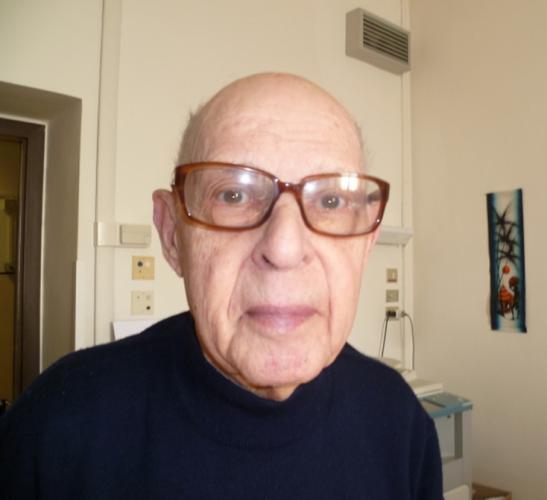Daniel Comboni
Comboni Missionaries
Institutional area
Other links
Newsletter
In Pace Christi
Agostini Germano
Fr. Germano was born in Fai della Paganella, in the province of Trent, on 16 February 1925. He entered the Florence Novitiate where he took first vows on 7 October 1943. He did the scholasticate first in Venegono, then in Verona and again in Venegono where, on 24 September 1948, he made his perpetual profession and, on 11 June of the following year, he was ordained priest. He was then sent to England to learn English. In 1951 he was assigned to Uganda where he spent almost 50 years in the missions of Maracha, Aber (2 periods), Matany, Lira-Ngeta (3 periods) and at Minakulu.
At this point we have some testimonies that will help us to reconstruct the work of Fr. Germano during his long life in Uganda.
Bro. Fernando Cesaro tells how he was with Fr. Agostini for two years at the same mission of Lira-Ngeta, from 1962 to 1964. He used to take him on Tuesdays when he went on safari to the chapels and, on Sundays, he would go to fetch him. Fr. Germano was doing evangelisation work: visiting the Christians, the families, preparing people for baptism and marriage. He would spend one week at the mission and the next on safari. He carried out this work of evangelisation during the early years. Afterwards, for 25 years, he was involved in the work of translating the liturgical books and catechisms into Lango, with the help of a confrere or a teacher. After Vatican II he began the translation of the entire Bible, a colossal task. “He was calm and peaceful, - Bro. Cesaro states – but the most important thing was that he was easy to live with”.
Fr. Riccardo Bolzonella remembers especially Fr. Germano’s physical suffering. He was still young and in Lira, at Comboni House, when he began to suffer from severe neuralgia which prevented him from doing anything: he often complained and sometimes stayed by himself because of the pain. His suffering was not well understood by the others and this saddened somewhat, causing him to become isolated and he felt a bit marginalised. At that time, in the diocese of Lira, the need was felt to have the Word of God translated into the local Lango language, since up to then people had been praying in a ‘foreign’ language (even though quite similar), Acholi. There was also the need, and the desire, to have the texts of the liturgy in the local language. Problems with his health led Fr. Germano to devote himself to the project of translations in the diocese. He had to work under difficult conditions: all the texts had to be typewritten by hand in Lira and then he had to travel 300 km to go to Kampala and to Kisubi, to have them printed. There, he had to get the work done, take the proofs home to correct them and then return to the typography”.
In 2000, Fr. Germano was assigned for good to Italy due to his bad health. He spent twenty years in Arco, Verona and Castel d’Azzano, where he died at the age of 95, on 27 May 2020. His funeral was celebrated on Friday 29 May. Since the community was still in isolation due to the coronavirus, it was not possible to take part physically in the funeral which was presided over by Fr. Renzo Piazza. The burial took place at the monumental cemetery in Verona.
In his homily, Fr. Renzo compared the figure of Fr. Germano with that of St. Peter who, in the Gospel of that day, meets the Risen Jesus at the Sea of Galilee.
“Three times Jesus calls Peter by name: Simon, son of John. And Fr. Germano, even in his old age, always called the people around him by name: the confreres, the workers, the young scholastics, including those from abroad, who passed fleetingly through the Fiorini Centre. A sign of respect, cordiality and real humanity. ‘Feed my sheep’, Our Lord repeated three times to Peter. With his work of translating, Fr. Germano allowed the Word of God to speak Lango; he fed the flock with the bread of the Word. His work was truly missionary. ‘When you are old, you will hold out your hands’: Fr. Germano had the gift of a long life and a period being elderly. To all this we must add his long old age with its aches and pains, its increasing limits and need. I will always remember his hand outstretched to anyone passing by his wheelchair, to ask for some little attention, a little affection, a small run through the corridors or some information. His wishes were not always granted … ‘Someone else will take you where you do not want to go’: perhaps he was dreaming of the missionary life in contact with people, some gratifying pastoral work or the satisfaction of baptising many people … His health problems probably took him where he did not want to go, to an office or to collaborate with difficult people. He never refused, never said no and never asked to go back home. He stayed while his strength lasted. ‘Follow me!’ Fr. Germano endeavoured to walk in the footsteps of his Lord. He inherited the Cross and he bore it for a long time, especially during his later years, filled with aches, pains and fragility”.

